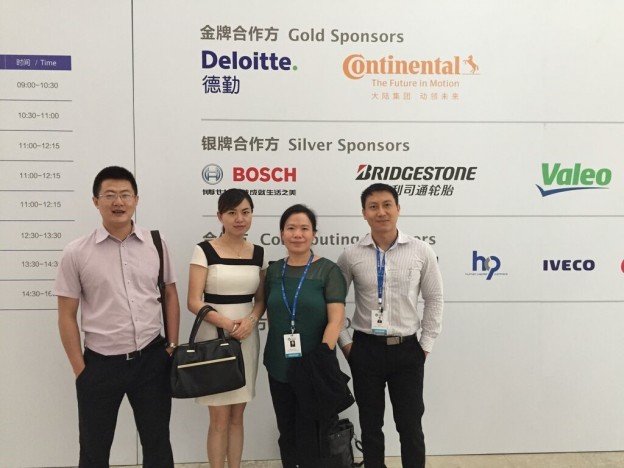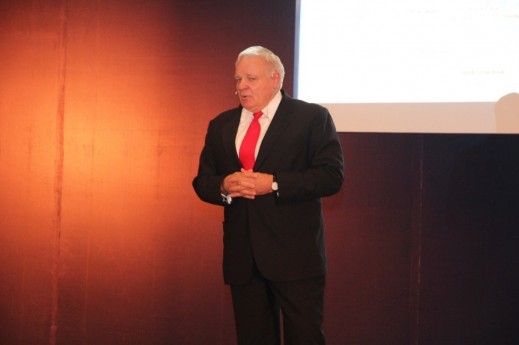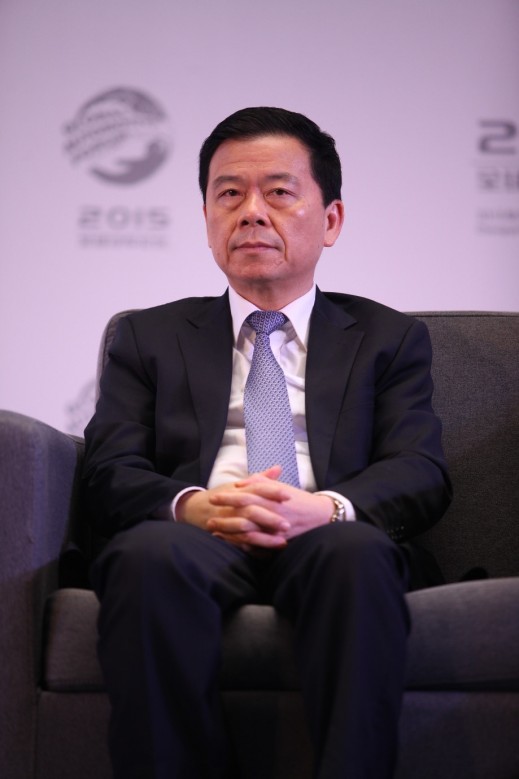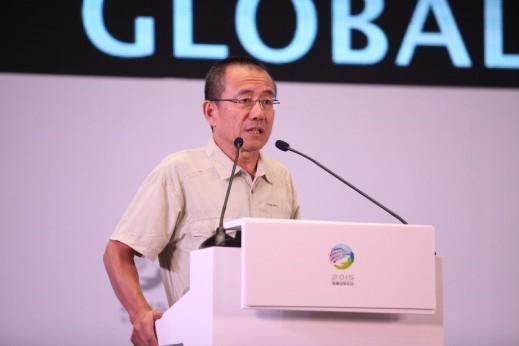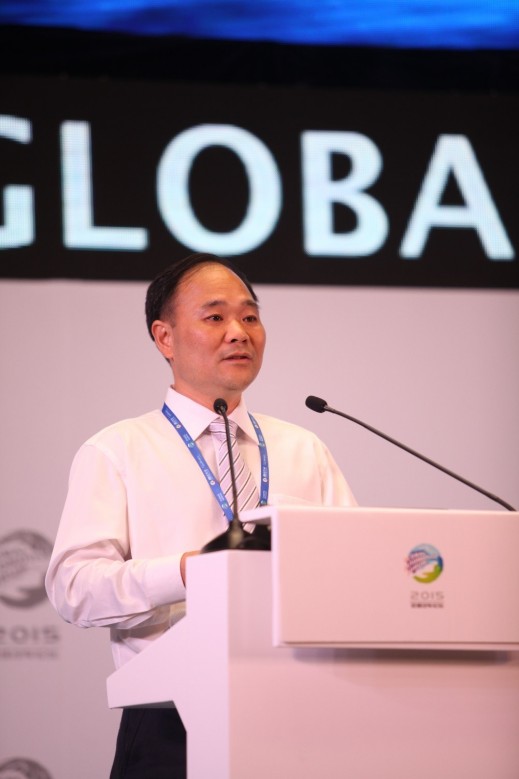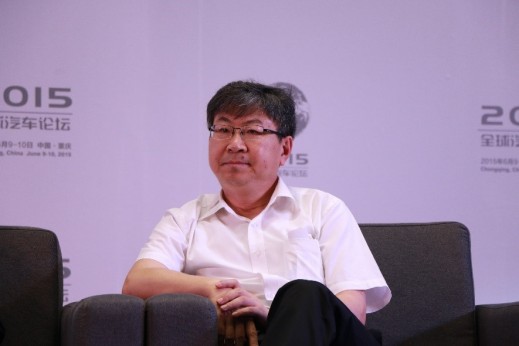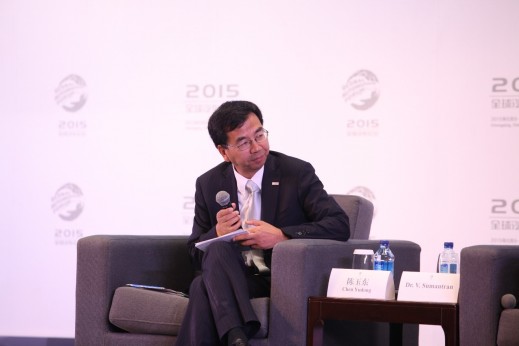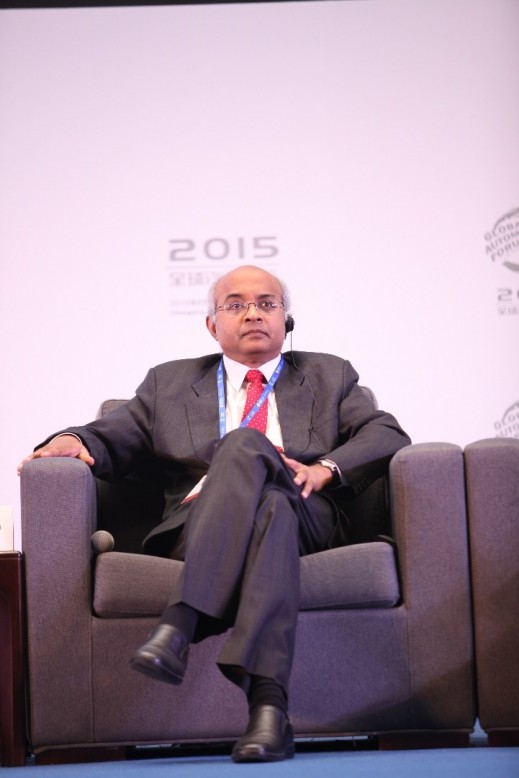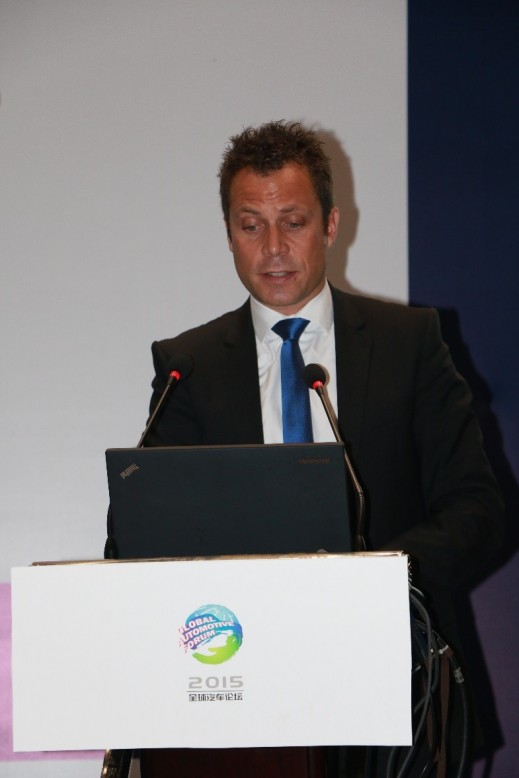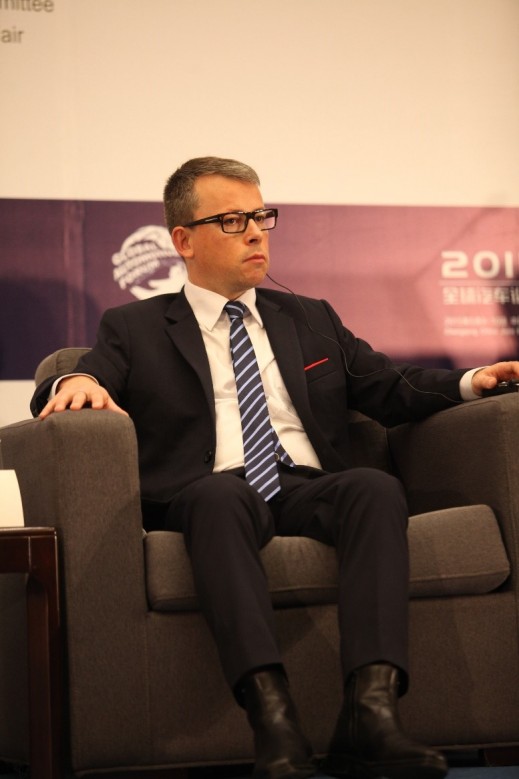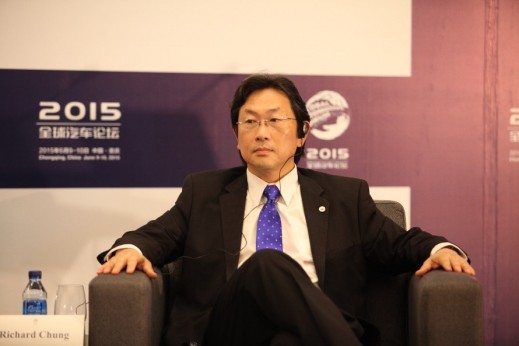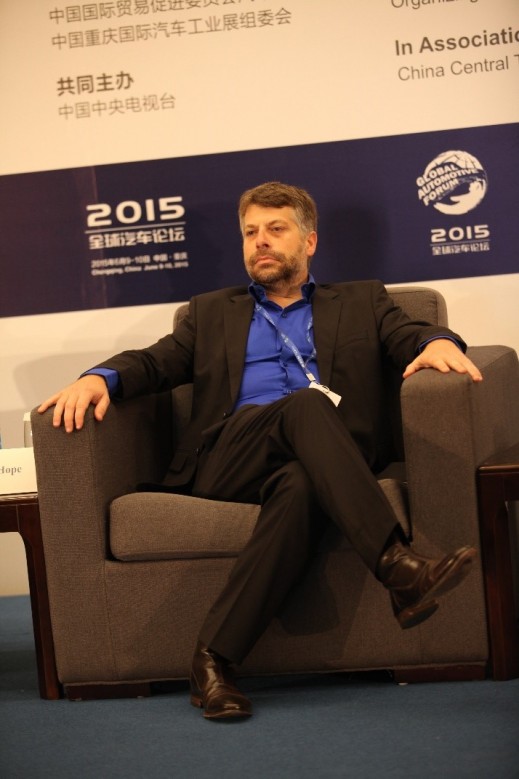Summary: HCP Human Capital Partners (HCP) was proud to sponsor the Global Automotive Forum (GAF) 2015 taking place in Chongqing, June 9 – 10. The GAF allowed participants to discuss the current state of the auto industry, brainstorm ideas for the future of the automotive market in China, and prepare for the structural changes and challenges facing the global automotive industry.
Article: Human Capital Partners (HCP) was proud to sponsor the Global Automotive Forum (GAF) 2015 taking place June 9 – 10. Coinciding with the Chongqing Auto Show, the GAF allowed participants to discuss the current state of the auto industry, brainstorm ideas for the future of the automotive market in China, and prepare for the structural changes and challenges facing the global automotive industry.
After 3 years in Wuhan and 2 years in Chengdu, this year’s forum was located in in the Chongqing Yuelai International Convention Center and was held in the summer instead of the fall.
HCP was represented at the GAF by Melanie Wu, Head of Beijing Office; Jerry Sun, Head of South West China; Leo Ji, Head of Shenyang Office; and Sharon Zhang, Head of Wuhan Office. They were joined by around 800 industry participants, 78 guest speakers and 162 members of the media from around the globe.
Participant at this year’s conference noted that the Chinese automotive market is presently facing a slowdown in growth due to a number of factors, but primarily because of transformations in the Chinese economy as a whole.
Mr. Liu Weidong, Vice President of Changan Automobile pointed out that Chinese auto manufacturers “are producing at less than 80% of capacity, less than 50% for some local brands.” This has led to lower prices and high inventory levels. Meanwhile, market growth is expected to remain at 3%, if not halting altogether. On top of this, local governments are increasingly issuing purchasing restrictions for personal automobiles. Around 30 cities are expected to have implemented car purchasing restrictions by 2020.
Comments by Mr. Xu Heyi, President of BAIC Motor Corporation., Ltd., went in the same direction. He described what he saw as internal and external factors of reduced growth. Internally, the industry is faced with technical challenges having to do with emission standards, power per liter in car engines and NVH technology that are putting downward pressures on profits. Externally, changes in the Chinese macroeconomic landscape are lowering the growth rate and limiting consumption. The environmental impact of the growing automotive market are also having a negative impact on demand in China. Mr. Xu predicted that more than 20% of automotive companies in China will be driven out of the marketplace. He still remains positive in his long-term outlook, however, stating that “innovation will bring many new opportunities to the long-history auto industry.”
Both Mr. Xu Heyi and Mr. Liu Weidong also discussed the transformative effects of technology on the automotive industry. Mr. Xu noted that “BAIC has changed from a traditional producer to a producer + innovative solution provider.” Mr. Liu noted that IT technology were driving his company’s upgrade in productivity.
In the same vein, Mr. Zhang Baolin, President of China Changan Automobile Group and Vice President of Changan Automobile, said: “In the Internet+ era, the auto industry is experiencing four big changes: customers are paying more attention to the user experience, auto products are becoming technologically smarter, the industry is becoming less vertical, and the business model is being diversified.” Mr. Zhang also noted the importance of quality for local brands as they innovate and design.
Peter Rankl, Vice President of Powertrain for the China/Korea divisions of Continental Automotive Holding Co., Ltd., China pointed out that rising Chinese fuel consumption standards were a major challenge for the automotive sector in the country. Standards will reach 5L/100KM in 2020. He then introduced Continental’s efforts on transmission technology systems that “aim to lower the cost of electric vehicles through technical improvements.” Continental just released a new generation of electric motors in Germany that are smaller and consumer less energy.
Mr. Yusuke Hasegawa, Managing Officer and Director of Honda R&D Co., Ltd. and Chief Operating Officer of the Advanced Research Division introduced Honda’s efforts to improve internal-combustion engines as well as develop alternative energy vehicles, such as hybrid electric vehicles, EVs, and hydrogen-powered fuel cell vehicles. Honda will soon introduce its fuel cell vehicles to the consumer market.
During a panel discussion on Industry 4.0, a concept referring to IT upgrading in manufacturing, Sebastian Bersch, General Manager of Siemens IBS China, pointed out that the next step in automotive industrialization will be the development of intelligent equipment and production processes. According to Mr. Bersch “Equipment intellectualization can help us know what we want to produce during the production process instead of predefining the production. We expect to have more flexibility in production as does China’s largest automobile company.”
Following up on Mr. Bersch comments, Christoph Rieger, Sales Manager of BOSCH gave an example of a production line replaced by BOSCH using RFID technology which increased production by 10% and decreased waste by 30%.
On a product level, Mr. David Mark Pascoe, Vice President of Engineering and R&D at Magna International Inc., said that it was likely that 90% of new cars will include connectivity functions by 2020.
Mr. Phil Murtaugh, the CEO of Qoros Auto Co., Ltd., indicated that big data, e-commerce, telematics and aftermarkets are all driving increased customization of products and services. It is also creating new channels for distributors and aftermarket sellers.
Speakers at the GAF also touched upon the internationalization of the Chinese automotive industry. Li Shufu, Chairman of Geely Group, which acquired Volvo around 5 years ago, noted that 70% of international mergers and acquisitions did not reach their goal because of cultural issues. Geely made great efforts to understand the management and enterprise culture at Volvo, which he believes is a great example for other Chinese auto companies. He also noted that Volvo supported Geely’s technological development after the acquisition. The two are now cooperating in the development of a compact modularized basic structure, which will be released in March 2016 and hit the market in the end of 2016.
In a panel on automotive financing, experts discussed the low penetration rate of automotive financing in the Chinese market. Mr. Tang Yunke, Vice President of China Financial Leasing Co.,Ltd. and Deputy Secretary-General of China Youth Entrepreneurs Association pointed out that the financial penetration rate in the new car market sits at around 15% in China, compared to 70% in Western countries. He believes that assets in this space will double within the next five years, from RMB 700 million now, to RMB 1.5 trillion. Jack Perkowski, Chairman of JFP Holdings, Ltd., noted that “two big challenges” to increase financial penetration ‘are the consumers’ attitudes and regulatory issues.”
In a panel on Auto Design and Styling: Innovation & Inspiration, held on the morning of June 10th Chen Zheng, VP of Changan Automotive Engineering Research Institute argued that automotive design is homogenizing across the industry. At the same time, the industry has increasingly focused on the user experience, in part as they look forward to the changing habits that are expected to come with smart cars.
In the same panel, Richard Chung, Vice President of Industrial Design & Craftsmanship, Global Interiors, Johnson Controls Automotive Interiors pointed out that today’s auto industry is developing rapidly, which will generate more opportunities for increased customization and personalization. This will require new design methods, especially in China where tastes often differ from more established markets.
Overall, the 2015 GAF allowed participants to explore key developments in the auto industry, the outlook and challenges in the global auto industry, the role of auto suppliers, the One Belt and One Road government strategy, and new energy vehicles. Participants also discussed auto financing and leasing, changes in manufacturing, smart cars, the aftermarket, as well as the integration of China’s automotive industry in the world.
Editors Notes:
Human Capital Partners is a retained executive search and talent management consultancy, which specialises in the global automotive sector. We provide CEO and top management placements & succession expertise across multinational automotive suppliers. Our expertise is our in-depth understanding of conventional and unconventional automotive companies with sector expertise including OEM’s, importers, auto financing, auto leasing, auto dealers, private equity firms and tier 1 suppliers.
PR Contact: Vanessa Moriel, Managing Director Asia (Tel: +852 2840 0406)
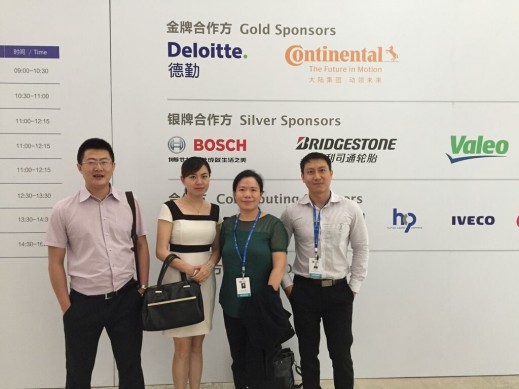
HCP’s delegation at the GAF, from left to right: Leo Ji, Head of Shenyang Office; Sharon Zhang, Head of Wuhan Office; Melanie Wu, Head of Beijing Office; and, Jerry Sun, Head of South West China.
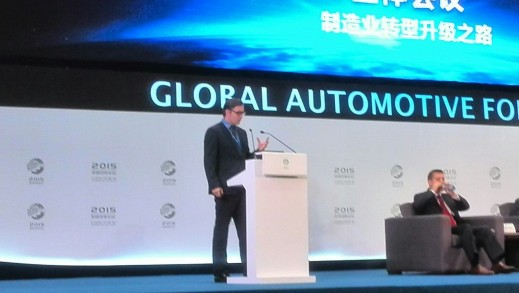
Sebastien Bersch, Managing Director, Siemens IBS China, talking at the Global Automotive Forum in Chongqing.
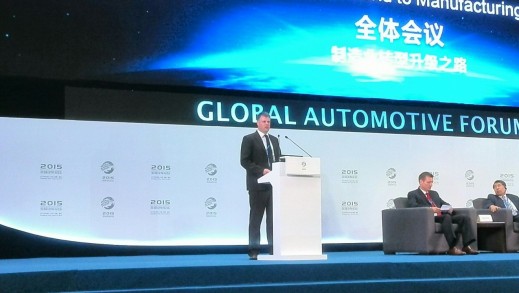
Christoph Rieger, Sales and Product Area Manager, Assembly Technology, Bosch Rexroth China, speaking at the 2015 GAF in Chongqing.
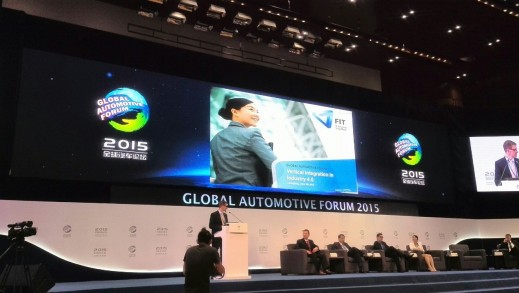
Siemens’ Sebastien Bersch spoke during a panel entitled From Workshop of the World to Manufacturing Powerhouse. The panel discussed industrial upgrading in China under new government plans introduced during the 13th Five-Year Plan. China is making major efforts to reduce its dependence on foreign technology and become more innovative.
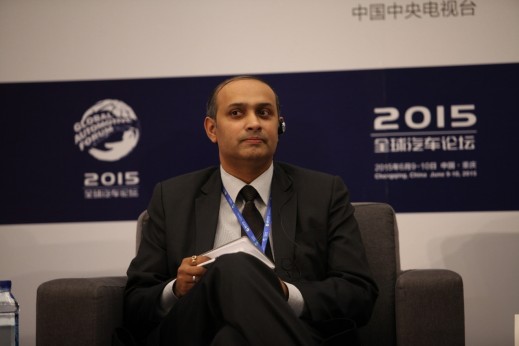
Shashikant Vaidyanathan, India-Pacific Regional Manager – Govt Relations, Strategy & Corp Affairs at Peugeot Citroën believes the One Belt and One Road strategy could benefit Chinese automakers. Connecting China will allow the development of the auto industry in an underdeveloped market. Second, increased trade between China and its neighbours will raise awareness of Chinese brands.
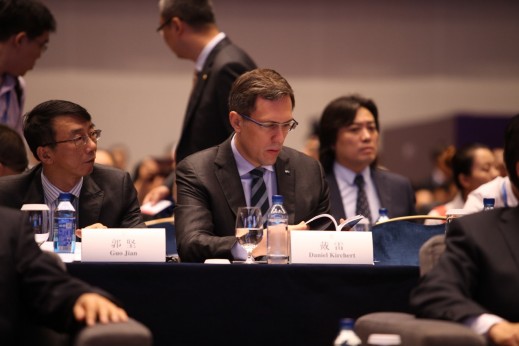
Daniel Kirchert, Managing Director, Infiniti Business Unit China, Infinti, together Guo Jian, Director of the Economic and Information Committee, Chongqing,
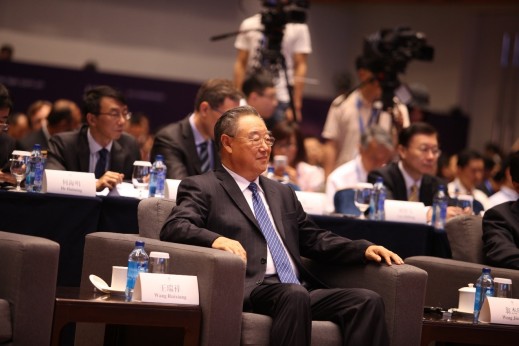
Wang Ruixiang, Vice-Chairman of the State-Owned Assets Supervision and Administration Commission of the State Council, Member of the Party Committee of the Commission on Discipline Inspection.
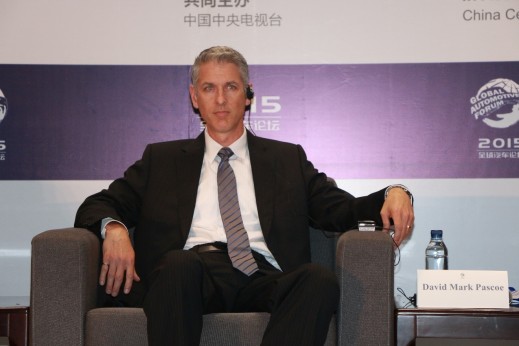
David Mark Pascoe, Vice President of Engineering and R&D,Magna International Inc., stated that by 2020, 90% of new cars would have connectivity features.
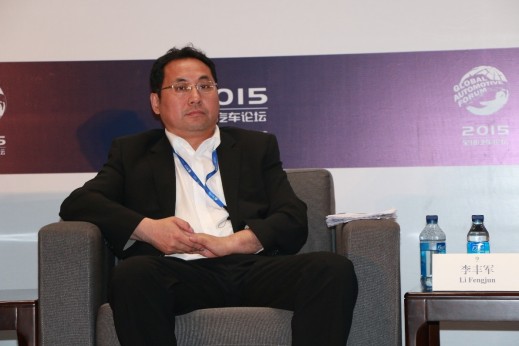
Li Fengjun, Director, Electric Vehicle Department, Technology Center, FAW Group spoke on a panel entitled Development Trends of Automotive Technology and Tomorrow’s Smart Car.
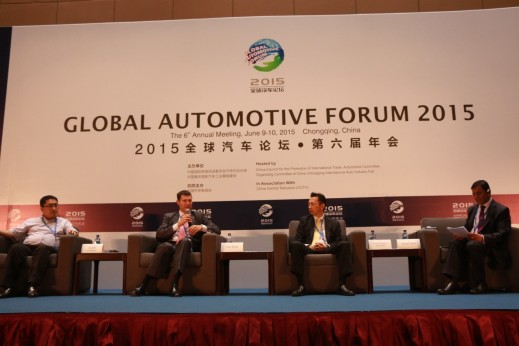
From left to right: Li Gaopeng, Deputy Director, Department of Technology, Zhengzhou Yutong Bus Co.; Peter Rankl, Senior VP Powertrain China & Korea at Continental; Yusuke Hasegawa, Senior Chief Engineer & General Manager, Technology Development Division 5, Honda R&D Co., Ltd.; Ashvin Chotai Managing Director, Intelligence Automotive Asia; talking at a brainstorming session on New Energy Vehicles, Impact of Lower Oil Prices.
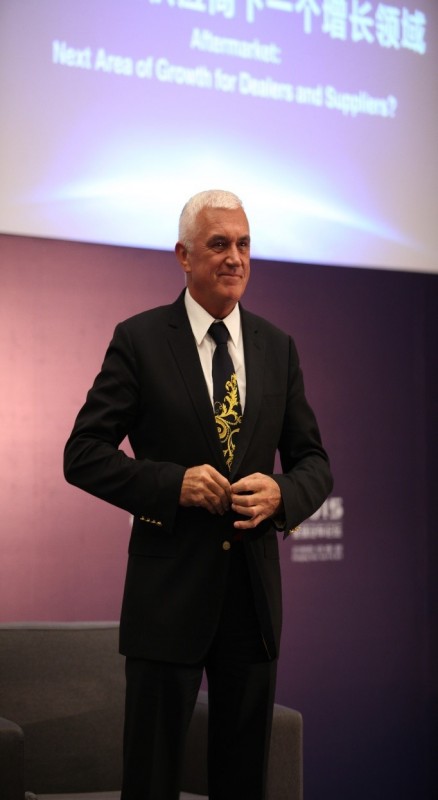
John Mack, CEO Asia Pacific, UTIL (Guangzhou) Auto Parts Co., Ltd, cast confidence in China’s car accessories market, saying “The potential of China’s automotive aftermarket has been great. China is very qualified for investments compared to the rest of the world. Success can be achieved as long as there is adequate knowledge and appealing products.”
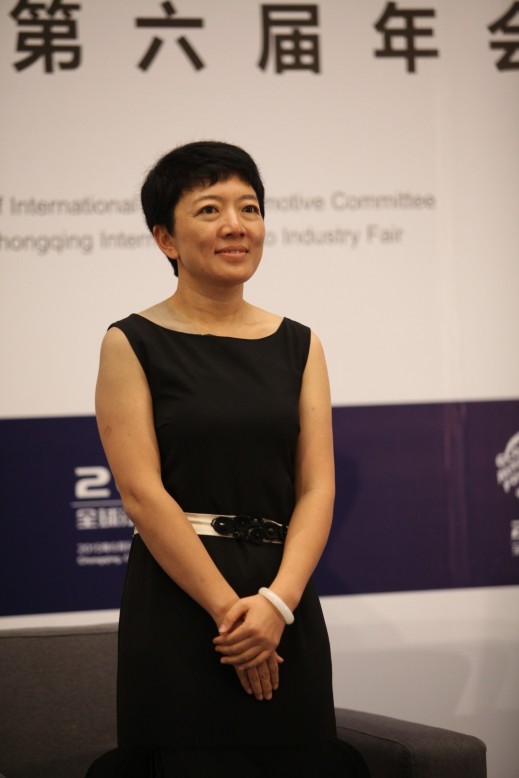
Ma Xiaowei, President of Iautos.cn pointed out that both traditional dealers and new online dealers will have to keep quality controls and provide good consumer services to survive in the aftersales segment of the industry. “The second-hand or used car selling is full of great business opportunities. In the future, the size of the second-hand car sales market will double, and even reach 20 million units,” said Ms. Ma.
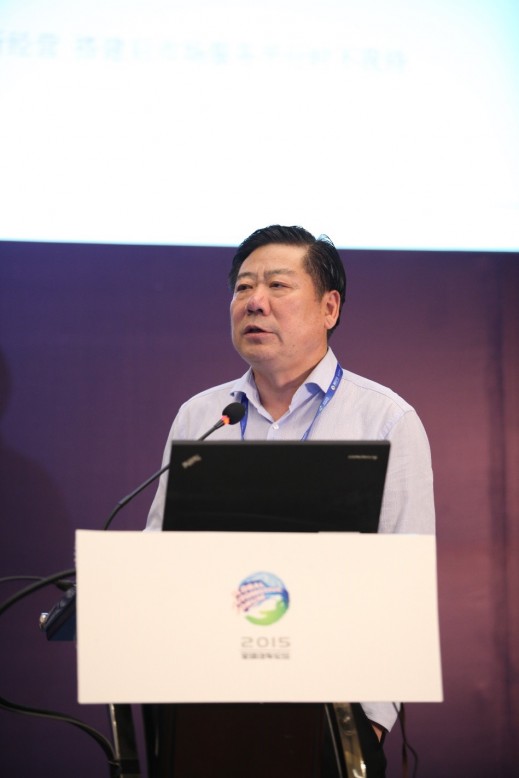
Pang Qinghua, Chairman of Pangda Group indicated that 4S stores are facing unprecedented challenges as consumers move from a single 4S store to a diversified system. Through this transformation process, the profit of automobile 4S stores has decreased sharply and the rate of defects has risen rapidly. “If enterprises want to remain invincible, they must stay up to date and continue to innovate,” emphasized Pang.
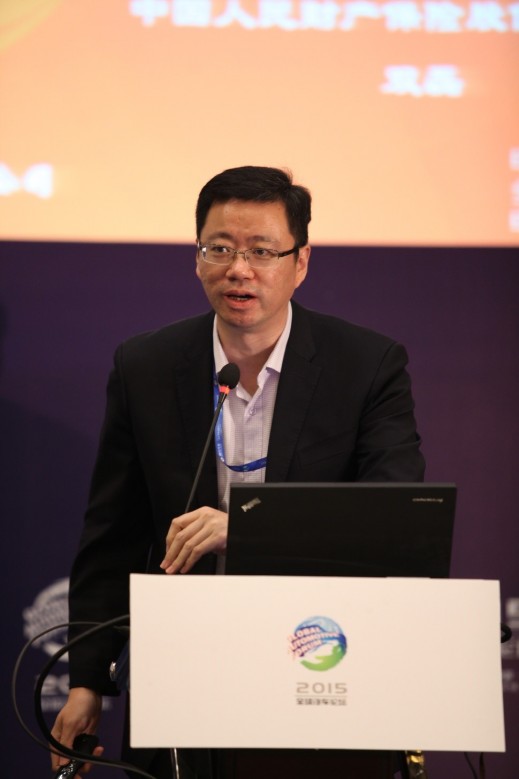
Shuang Lei, General Manager of Auto Insurance, PICC, believes that as car ownership in China increases, the insurance industry could gain more and more attention through Auto aftersales, ultimately providing new development opportunities. He stated that, the “Auto insurance industry and Auto aftersales service should cooperate and establish a win-win relationship.”
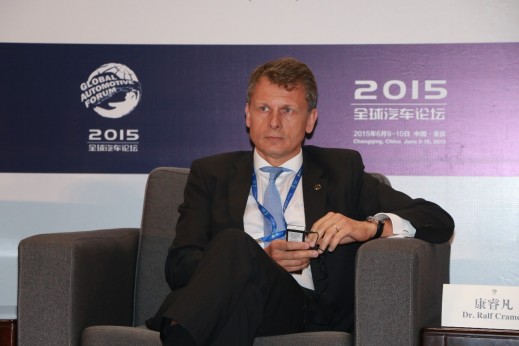
Dr. Ralf Cramer, Member of the Executive Board of Continental AG; President and CEO of Continental China believes that the Chinese market used to only pay attention to quantity. However, as the market has developed, it has increasingly paid attention to quality. The next 3-4 year of investment by parts manufacturers in China will reduce production costs. Continental has 1,400 engineers, 25 factories and several R&D centers in China. The Chinese market has been an important driver of growth for Continental over the past 15 years. It hopes to become a localized player in the next 20-30 years.
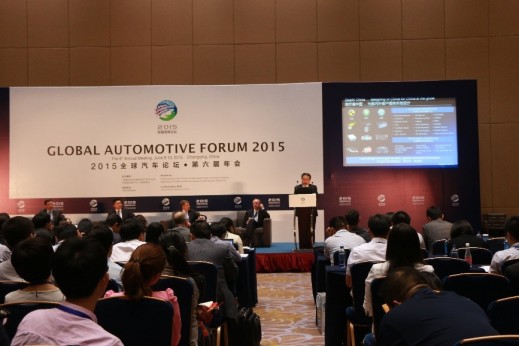
Dr. Simon Yang, President of Delphi China, Managing Director, Asia Pacific, Connection Systems, Delphi Electrical/Electronic Architecture.
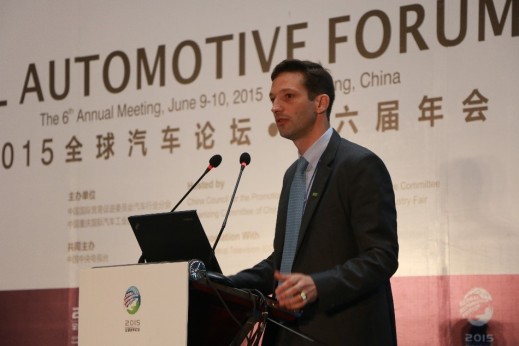
Edouard de Pirey, President of Valeo China. Valeo is continuing to invest in China, where it already has 26 plants and 15,000 employees. Valeo has also been growing its R&D capacity in the country with the establishment of ten development centers and three research centers. China is expected to become Valeo’s country in terms of sales. The group has been investing more than RMB 1 billion a year in China
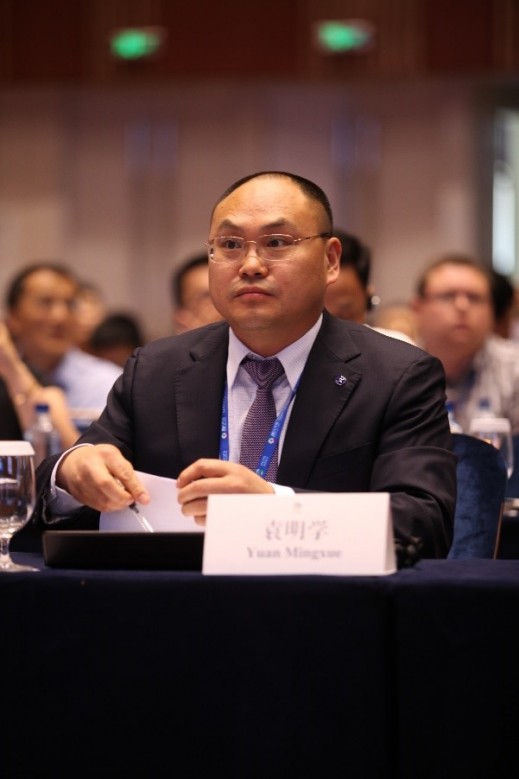
Mr. Yuan Xueming, the Vice President of Changan Automobile, indicated that Chinese auto makers must improve R&D abilities to grow the influence of their brands. Cultural factors also need to be understood. He pointed out that the Chinese auto companies need to cooperate together to enter the global market.
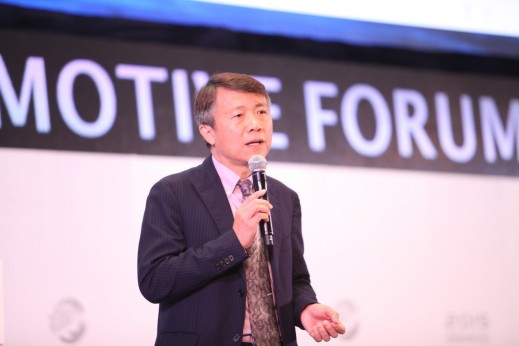
Jack Cheng, CEO of Magneti Marelli China, Vice President of FCA APAC, Chairman of Fiat Automotive Finance Co., Ltd.,
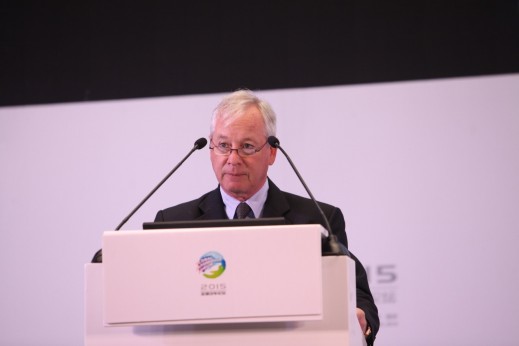
Phil F. Murtaugh, Chief Executive Officer at Qoros Automotive Co. Mr. Murtaugh previously served as the Chief Executive of Asian Operations at Daimler AG. He also served as the Chief Executive Officer of CODA Automotive.
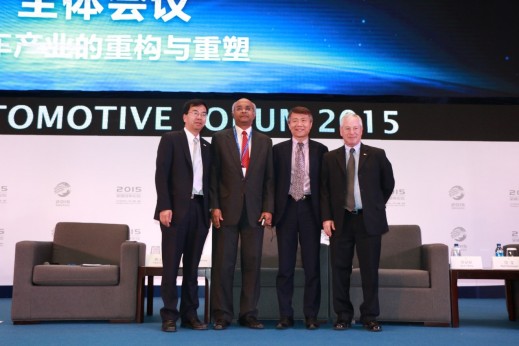
Left to right: Dr. Chen Yudong, President of the China Investment Corporation; Dr. Venkataramani Sumantran, Chairman, Celeris Technologies; Jack Cheng, CEO of Magneti Marelli China, Vice President of FCA APAC, Chairman of Fiat Automotive Finance Co., Ltd.; and Phil F. Murtaugh, Chief Executive Officer at Qoros Automotive Co., following their Plenary session on Restructuring and Reshaping the Auto Industry


